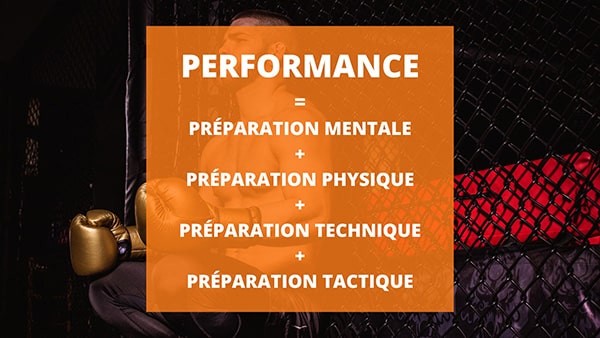"It's because of his steely mind that he won!" or "She really knows manage stress ! ". How many times have you heard this kind of phrase about an athlete who has just won an event or competition? Often, I guess. And for good reason. In the same way as physical preparation, the mental preparation is one of the pillars of success. But what is it exactly? Why use it? And how can you work on your mind? So many questions for which you will find answers in this article.
What is mental preparation?
Have you ever wondered what athletes like Michael Phelps, Serena Williams or Ronnie Coleman ? Why did they dominate their sport so much against formidable and prestigious opponents? What were the reasons for these numerous victories?
Physically and technically, they were probably better than other athletes. But over the course of their careers, the real difference was elsewhere. Their secret to continuing to win after so many years? They approached each competition by taking care to set up an optimal mental preparation.
To explain what is the psychological preparationLet us quote Jean Fournier, President of the French Society of Sport Psychology (SFPS) since 2017. A true specialist in his field, Jean Fournier is known for having worked for 20 years with many professional athletes and Olympic coaches, as well as with the FFG (French Golf Federation).
He defines mental preparation as " preparation for competition by learning mental and organizational skills ". Still according to him, " the main goal is to optimize the athlete's personal performance. In order to do this, it is necessary to help the athlete meet the optimal conditions for performance in competition, while promoting the pleasure of his or her practice and encouraging the achievement of autonomy. ".
In other words, this means that to be the best in your sport, good physical condition is not the only area to work on. Of course, technique is also important, as well as the tactical aspect. But to progress and improve its performanceIt is also necessary to train the mind in a methodical way.
Who is the psychological preparation for?
By imposing unconscious barriers or blocks, the athlete slows down the achievement of his full potential. It is however a key element of the sports performance.
In this sense, mental preparation is not only reserved for professional sportsmen. It is useful for everyone, not only in the sports field. It can also be beneficial on a private or professional level.
Therefore, it can be advantageous for:
- a professional athlete wishing to prepare for a competition
- an amateur athlete wishing to improve his performance
- an entrepreneur planning to start a company
- an employee who wants to prepare for a public speaking engagement
- etc.
In France, mental preparation is often confronted with preconceived ideas that tarnish its reputation.
Fortunately, many countries have long understood its benefits. Anglo-Saxon countries, for example, integrated it very early on into their training routines for high-level athletes and other Olympic athletes.
Believe in the effectiveness of mental preparation
" Mental preparation is for the weak! " or " You have to believe in it for it to work... ". If you are confronted with this type of remark, you can put forward several arguments that will leave your interlocutor on the spot, by providing concrete examples.
A mental coach is not a guru. These professionals have degrees in sports psychology, which is not really the same thing. These consultants have taken many courses and practical training sessions that allow them to help athletes in their stress management and their emotional approach to practice.
Do you really think that Laure Manaudou was weak when she won all her medals? No, of course not. As she said herself: " I didn't love swimming, but I did love winning ". She had incredible mental strength that took her to the top of the world and made her a champion.
I didn't love swimming, but I did love winning.
Laure Manaudou
For those nostalgic for the World Cup, do you think Aimé Jacquet was some kind of guru? Again, no! He knew how to surround himself with a competent staff, composed of consultants, psychologists, physiotherapists, nutritionists and other professionals in their field. This is also what allowed him to instill in his players a team spirit and a mental attitude strong enough to lead them to victory.
Same thing 20 years later, in 2018, with Didier Deschamps.
Why do mental preparation for sports?
The benefits of mental preparation in sport are numerous. This discipline allows :
- To better manage stress in order to be less apprehensive about different situations;
- increase self-confidence, and thus give off positive vibes;
- set goals, and above all, give yourself the means to achieve them;
- develop leadership qualities and lead your team to the highest level;
- increase mental ability;
- increase the level of motivation;
- to strengthen the cohesion of the group, because together we are stronger;
- improve communication within the team and with the coach.
Just as you prepare your physique during your trainingsIt is just as important to exercise your mind. It is essential to manage stress, maintain motivation or accept pain and hardship. You just have to be well prepared.
How to work on your mind?
In order to avoid having your spirits quickly lowered and being tempted to give up too quickly, you must always keep in mind your objective. If you are aware of your state of fatigue or pain, it will allow you to react quickly and to regain the upper hand.
Accept
Acceptance is one of the keys. Indeed, acceptance is another step towards success.
By having trained your mind to find solutions to overcome a difficult moment, you can move mountains. Thanks to your memory, you know that there is a solution because you have already experienced the situation.
For example, think of similar exercises or competitions. Have confidence in yourself. If you're there, you've prepared well and are willing to go the distance. Holding on to positive feelings is critical to success.
Focus
Every athlete has their own way of staying focused, regardless of the sport.
Have you ever watched soccer players or swimmers arrive before a game or competition? Some have headphones on to listen to music, some have closed faces, some seem to be carried away by the fervor of the crowd.
The same thing happens at the starting line of a track and field race. While Usain Bolt is relaxed and puts on a show, some of his opponents are staring at the finish line, oblivious to the surrounding noise.

Anticipate
Anticipation is also an excellent technique.
Before a race, downhill skiers or Formula 1 drivers, for example, engrave the route in their memory. They know exactly which stages they will have to go through and what to expect.
By identifying obstacles during mental training, they are much more comfortable in the moment of truth.
This is also true for combat sports practitioners. If an athlete makes a certain hold, it is because he will have anticipated his opponent's hold and will know how to counter it.
Prepare your mind for the competition
During a competition of strength trainingThe participants know that they will be confronted with a very particular stress. It is necessary to have done a lot of work beforehand in order to be ready on the day.
I often use the example of the Olympic Games, but this is also true for all other competitions. During the Olympics, spectators witness the achievements and failures of men and women who have devoted years of their lives to shine on this day. For some, this leads to a consecration. But for others, it is an immense disillusionment.
To best approach this event, it is in the interest of these athletes to call upon a mental coach. The latter will be able to accompany them towards success through different techniques.
Avoiding negative thoughts
Negative thoughts must be overcome and cleared to win.
Stress, fear of injury and failure, lack of confidence, pressure (from the public, coaches, referees, etc.): all of these parameters will affect potential success. All these thoughts weaken the athlete, make him/her doubt or hesitate, which will have an impact on the decision making.
Fortunately, there are a few techniques to sweep them under the rug: using key words or phrases, adopting relaxation, controlling your breathing or view.
Precisely, the breathing techniques and relaxation exercises are an excellent way to optimize your mental preparation for sports. The 3 x 6 method is one of the best known. It simply consists of breathing in deeply through your nose for 3 seconds, before exhaling through your mouth for 6 seconds, while relaxing your entire body.
Use key words or phrases
Whether it's just words or short phrases, they should be powerful and positive. For example: "fast", "agile", "focus", "I feel good" or "I am confident".
A bit like the Coué method, which consists of anchoring positive thoughts in our minds, by repeating rewarding phrases to ourselves twenty times so that they make their way into our subconscious.
View
Used by 95 % Olympic athletes, the visualization allows you to mentally imagine your sport.
Roger Federer explains it perfectly: " Before I play a match, I see myself playing points typically suited to my opponent's style. It helps me prepare mentally and when I go out on the court, I feel like I've already played ". Same technique for golfer Tiger Woods: " Before each shot, I visualize with the camera that I have in my head... It is a key to my concentration and the positive approach of each shot... ".
The technique of visualization is also very useful for injured athletes who cannot train. Visualizing is about creating images in your mind. This is also what bobsledders (athletes who practice bobsledding) or pole vaulters do, because their discipline requires a violent or intense physical effort, which is very tiring. The mind comes in support of the body and applies another form of training, just as important.
Whether in team sports (rugby, basketball, volleyball, etc.) or in individual sports (cycling, swimming, running, etc.), projecting the course of an event allows for better preparation. In American soccer, quarterbacks regularly consult with mental coaching. Thanks to the imagery, they can project the different movements of their teammates so they don't have to improvise on game day.
These preparation techniques can easily be applied to weight training. Mental visualization of your goal will help you achieve it. Let's say you want to lose 20 pounds. This is an ambitious project that requires time, discipline and motivation. It is normal that you will go through more difficult phases during which you will think about giving up.
The mental discipline will give you a boost. Imagine yourself with 10 kilos less, visible abs and drawn muscles. You'll remember why you're doing all this effort.
My psychological preparation for bodybuilding
In bodybuildingAs in many other disciplines, the presentation of our physique lasts only a few minutes. Backstage or behind the curtain, you wait for your name to be announced before going on stage. You know that your performance in front of the judges must be impeccable if you want to stand out from your opponents.
My conditioning
It starts well before the competition. Those who follow me know that in the months leading up to the competition, I impose on myself a very strict diet and a very specific sports training. My concentration is optimal and I work a lot on my choreography.
The main enemy to fight is stress. If you let it get to you, you may experience water retention. Your physique may deteriorate visually. Your muscle definition would be less pronounced and you would lose points to your competitors.
My tactics on D-Day
My personal method of mental preparation is based on 3 points:
- be positive
- stay concentrate
- take some pleasure
Before and during my passage, I am focused on my posing. I visualize the sequence of my poses over and over. My mental qualities help me to stay focused and positive.
My optimistic nature is a great support for my fighting spirit. I aim to win by giving my best. I also take a lot of pleasure during these few minutes on stage. In order to smile as naturally as possible, in front of impartial judges, I remember moments of intense joy to let only positive emotion show through.
In conclusion
As you can see, having a athletic mind is as important as maintaining or preparing your physique. With the stress of competition, the negative side will tend to want to take over the space. You will need to focus on the psychological aspect so that the brain is receptive to the message. Have confidence in yourself! Inner self-motivation is greatly facilitated by the passion you feel. Persevering by being determined, being satisfied to go all the way, will forge a more combative character and help you overcome the trials. Without being a competitor, if your goal is to change your bodyYou will be led to the same reflection as a high level athlete and mental preparation will help you deeply.
Additional articles :











4 Comments
Very good topic and especially very important 💪
Great article, it's really a neglected and yet essential area. In high level sport they have understood it well. I have to work on this point
Thank you
Like what, you learn something every day 🙂
Thank you for your advice & I look forward to hearing from you
Seb